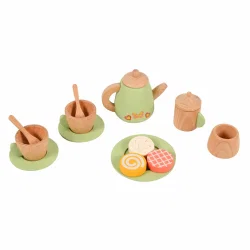The Educational Benefits of Role-Play Toys for Children
2024-09-29
Role-play toys have long been a favorite for children, allowing them to imagine, create, and explore different worlds. From doctor kits to kitchen sets, these toys provide more than just fun—they offer an opportunity for learning and development. Let’s take a look at how role-play toys can positively impact your child’s growth.
1. Encouraging Creativity and Imagination
One of the biggest advantages of role-play toys is that they encourage kids to think outside the box. With a simple set of toys, like a pretend grocery store or pirate ship, children can create whole worlds, characters, and scenarios. This type of play allows them to explore new ideas and build narratives, sparking their creativity and expanding their imagination.
2. Developing Social and Communication Skills
Playing with role-play toys often involves interaction, whether with siblings, friends, or even parents. For example, a child might play “restaurant” and take orders, preparing meals for their "customers." This type of imaginative play helps them practice communication, listening, and negotiation skills. It also allows them to experiment with different social roles, such as leader or helper, building confidence in their ability to interact with others.
3. Building Problem-Solving Abilities
Role-play toys help kids learn how to solve problems in a playful environment. For example, a pretend doctor's kit teaches children how to care for a patient or handle an emergency. These scenarios prompt them to think through solutions, develop critical thinking skills, and practice patience, all while having fun.
4. Enhancing Emotional Understanding
Through role-play, children explore various emotions in a safe and controlled setting. Acting out different scenarios, like playing a parent comforting a child or a firefighter saving someone in trouble, helps kids develop empathy and emotional intelligence. They learn how to respond to emotions like fear, joy, and sadness, which is crucial for their social development.
5. Improving Fine Motor Skills
Many role-play toys, such as toy tools, pretend cooking sets, or dollhouses, require children to use their hands and fingers in a precise manner. This helps improve their fine motor skills, which are important for writing, drawing, and performing everyday tasks. Whether it's turning a screwdriver on a toy tool or slicing pretend food with a toy knife, these actions enhance coordination and dexterity.
Conclusion
Role-play toys provide children with more than just entertainment—they foster creativity, develop social and emotional skills, and improve problem-solving abilities. By incorporating role-play toys into your child’s playtime, you're helping them build important life skills in a fun and engaging way.



